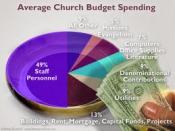 It’s Not Your Job To Be The Teacher
It’s Not Your Job To Be The Teacher
I have been a public school teacher for 40 years! For forty years teaching has been my job. That is how I financially supported my family. It became my identity, defining who I am. I would introduce myself as, “I am Anthony Bachman; I teach 8th grade at Spring Grove Middle School.” Being acknowledged as “Teacher of the Year” by my school district during the last year of my career was a fulfilling honor, signifying my professional growth as a struggling “new teacher”, maturing into a master teacher, gleaning from other educators that I admired, being willing to change with the times, the climate, the new swing in educational philosophy over a four decade experience. All that changed in June of 2011 when I retired”. Then I discovered that I was still a teacher, in spite of my new employment status, for it was what drives me; it’s my passion.
I was fortunate having Clarence Barnhart who received the honor of being one of the Top 10 Qualifiers for Teacher Of The Year for the state of Pennsylvania as my educational mentor. He was dynamic, creative, highly organized, motivated, loved kids, love coaching by introducing track to athletes and developing them for High School, great at intramurals, willing to try new ideas while incorporating multi-disciplines into his teaching style. Rather than lecturing and showing filmstrips and films about the Revolutionary War, he taught students how to research history for themselves, how to dig for answers, how to discover history nationally, state wide, and even locally. His students not only “knew” their history but “experienced” it! That is what teaching is all about: not only knowing your subject matter, but experiencing it, living it, consuming it, making it part of your being!
 As I began my retirement, I spent time reading my Bible. I soon realized that Jesus’ model of teaching differed from my Westernized thought and experience. Jesus never took a “course” or “earned a degree”, but confounded the spiritual intellects of his day at the Temple when he was only 12 years old! He “earned the respect” of being called “rabbi”, teacher, for what he taught and how he taught with “power”. Now a successful rabbi, he never founded a College or University on “new Jewish thought”, but chose 12 of the most unlikely candidates in which to invest his “teaching” career. He walked with them, discussed one on one with them, lived with them, ate with them, taught them through life experiences, even taking them to Jerusalem and to face the cross and his resurrection. Their education continued on the Road to Emmaus, as they were explained “all things” and the fulfillment of the gospel by Jesus. With his ascension, their education came through the Holy Spirit who taught them that in Christ there is no difference between male nor female, Jew or gentile, master or slave, nor rich or poor. How I taught for forty years as a public school teacher was so foreign to the way Jesus taught in his three-year career as a rabbi, or teacher. I taught academics; Jesus taught experience. I taught intellectual theory; Jesus taught practical everyday life style. I taught through my intellect; Jesus taught through His Spirit!
As I began my retirement, I spent time reading my Bible. I soon realized that Jesus’ model of teaching differed from my Westernized thought and experience. Jesus never took a “course” or “earned a degree”, but confounded the spiritual intellects of his day at the Temple when he was only 12 years old! He “earned the respect” of being called “rabbi”, teacher, for what he taught and how he taught with “power”. Now a successful rabbi, he never founded a College or University on “new Jewish thought”, but chose 12 of the most unlikely candidates in which to invest his “teaching” career. He walked with them, discussed one on one with them, lived with them, ate with them, taught them through life experiences, even taking them to Jerusalem and to face the cross and his resurrection. Their education continued on the Road to Emmaus, as they were explained “all things” and the fulfillment of the gospel by Jesus. With his ascension, their education came through the Holy Spirit who taught them that in Christ there is no difference between male nor female, Jew or gentile, master or slave, nor rich or poor. How I taught for forty years as a public school teacher was so foreign to the way Jesus taught in his three-year career as a rabbi, or teacher. I taught academics; Jesus taught experience. I taught intellectual theory; Jesus taught practical everyday life style. I taught through my intellect; Jesus taught through His Spirit!
 Just as I became a “professional” educator and thought my way was the correct way; it is easy to become a “professional” Christian, a member of the clergy, who can feel his way is the correct way. We have been “trained” to think and act “professionally”, intellectually. It’s our job! It is the way we identify ourselves. It becomes who we are, and if the Holy Spirit shows us that our mind set is foreign to the actual ways of teaching the gospel, we become defensive and personally assaulted. At least I did as a professional educator. All my higher educated role models, professors, lectured “what they knew through their P.H.D. degrees” to us students; all our higher elevated role models, senior pastors, Bishops, etc., preach, religiously lecture, to us “what they know through their theological doctorate degrees”. Their methods of teaching are the same, yet “lecturing” has been proven one of the most ineffective ways of teaching! Having students “experience” their material is far more effective.
Just as I became a “professional” educator and thought my way was the correct way; it is easy to become a “professional” Christian, a member of the clergy, who can feel his way is the correct way. We have been “trained” to think and act “professionally”, intellectually. It’s our job! It is the way we identify ourselves. It becomes who we are, and if the Holy Spirit shows us that our mind set is foreign to the actual ways of teaching the gospel, we become defensive and personally assaulted. At least I did as a professional educator. All my higher educated role models, professors, lectured “what they knew through their P.H.D. degrees” to us students; all our higher elevated role models, senior pastors, Bishops, etc., preach, religiously lecture, to us “what they know through their theological doctorate degrees”. Their methods of teaching are the same, yet “lecturing” has been proven one of the most ineffective ways of teaching! Having students “experience” their material is far more effective.
In “equipping the saints for the work of service,” we often feel we, the teachers in the Church, have to teach the materials that we are most comfortable with in our own faith journeys. Here is the hard lesson that I have had to learn: I AM NOT the teacher; Jesus, His Holy Spirit, IS the teacher. Jesus, upon his ascension to heaven to sit at the right hand of God, promised to send the Holy Spirit “who will teach you all things”. He is the teacher. Jesus continually taught through example while being a human on earth. His teaching HAS NOT ceased, for His Holy Spirit has been sent to CONTINUE the job. We need to get out of the way and allow the Holy Spirit to teach!
If someone opens the Bible on their own, the Holy Spirit can teach them its truth; it is called “revelation”. He, the Holy Spirit, is the “revealer of truth”! Some of the best teaching comes through private daily devotions when it is only the individual believer with the Holy Spirit reading the Word, the Bible, together privately. The Holy Spirit “recalls” those passages in the believers every day life, making the Logos Word, the written Word, the Rhema Word, the living word. Not only does the Holy Spirit help the believer in Jesus to “hear” the Word in their private time together, but calls them to be “doers” of the Word, experiencing it!
 Bottom Line: If we are to be teachers helping to “equip the saints for the work of service”, we need to teach them how to hear the Holy Spirit on their own, how to be obedient to what has been “revealed”, seen & heard, and learn to walk out their faith on their own, relying only on the Holy Spirit. Then we have “equipped” them properly. It has nothing to do with the intellect; it has everything to do with “obedience” to the Holy Spirit, so let’s allow the HOLY SPIRIT to be the TEACHER! It’s just NOT our job! It’s HIS!
Bottom Line: If we are to be teachers helping to “equip the saints for the work of service”, we need to teach them how to hear the Holy Spirit on their own, how to be obedient to what has been “revealed”, seen & heard, and learn to walk out their faith on their own, relying only on the Holy Spirit. Then we have “equipped” them properly. It has nothing to do with the intellect; it has everything to do with “obedience” to the Holy Spirit, so let’s allow the HOLY SPIRIT to be the TEACHER! It’s just NOT our job! It’s HIS!















































































